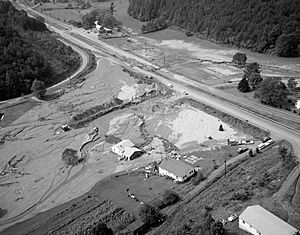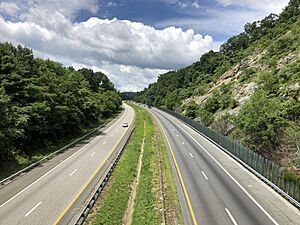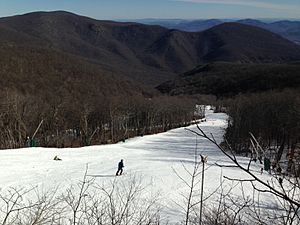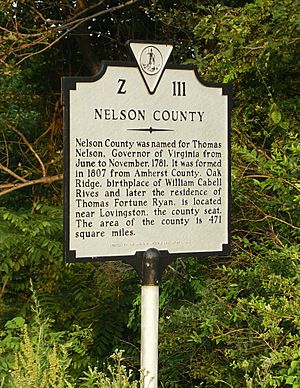Nelson County, Virginia facts for kids
Quick facts for kids
Nelson County
|
|||
|---|---|---|---|
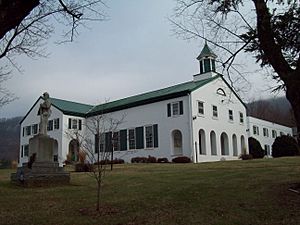
Nelson County Courthouse
|
|||
|
|||
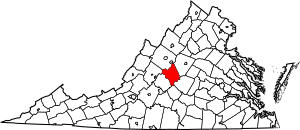
Location within the U.S. state of Virginia
|
|||
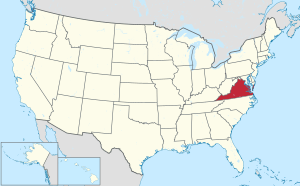 Virginia's location within the U.S. |
|||
| Country | |||
| State | |||
| Founded | 1807 | ||
| Named for | Thomas Nelson Jr. | ||
| Seat | Lovingston | ||
| Largest community | Nellysford | ||
| Area | |||
| • Total | 474 sq mi (1,230 km2) | ||
| • Land | 471 sq mi (1,220 km2) | ||
| • Water | 3.5 sq mi (9 km2) 0.7% | ||
| Population
(2020)
|
|||
| • Total | 14,775 | ||
| • Density | 31.17/sq mi (12.035/km2) | ||
| Time zone | UTC−5 (Eastern) | ||
| • Summer (DST) | UTC−4 (EDT) | ||
| Congressional district | 5th | ||
Nelson County is a place in Virginia, a state in the United States. It's called a county. In 2020, about 14,775 people lived there. The main town, or county seat, is Lovingston. Nelson County is also part of the larger Charlottesville area.
Contents
History
Long ago, in the 1600s, a Native American tribe called the Nahyssan lived in the area that is now Nelson County. They spoke a language called Siouan.
Nelson County was officially created in 1807. It was formed from a part of Amherst County. The county was named after Thomas Nelson Jr.. He was an important person who signed the U.S. Declaration of Independence. He was also the Governor of Virginia in 1781. There was another county named after him earlier, but it became part of Kentucky.
Hurricane Camille
On August 19-20, 1969, Nelson County faced a terrible flood. This happened because of Hurricane Camille. The hurricane had hit the coast a few days before. It then moved inland and got stuck over the Blue Ridge Mountains.
It rained a huge amount, about 27 inches (686 mm), mostly in just three hours. Some places got over 37 inches (940 mm) in five hours. The ground was already very wet from rain the day before.
The heavy rain caused sudden floods and mudslides. Sadly, 153 people died. Many bridges were washed away, and some towns were completely underwater. In one small town called Davis Creek, 52 people were lost or killed. Only 3 out of 35 homes were left standing.
Some bodies were never found. Others were carried far downstream by the water. The whole county was cut off because roads, bridges, phones, and electricity were all gone.
The rivers in Nelson County flow into the James River. The James River also flooded badly in other parts of Virginia. The disaster caused over $140 million in damage in 1969. Nelson County was the hardest hit, with one percent of its people killed. You can learn more about Hurricane Camille at the Oakland Museum.
Geology
Nelsonite is a special rock named after Nelson County. It is the official state rock of Virginia. Nelsonite is made mostly of two minerals: ilmenite and apatite. This means it has a lot of titanium and calcium phosphate.
Geography
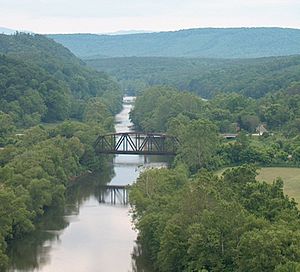
Nelson County covers about 474 square miles (1,228 km²). Most of this is land, with a small part being water. The Blue Ridge Mountains are on the northwest side of the county. The James River forms the border on the southeast side. Inside the county, there are rivers like the Rockfish, Tye, and Piney rivers, along with many creeks.
Adjacent counties
- Augusta County – northwest
- Albemarle County – northeast
- Buckingham County – southeast
- Appomattox County – south
- Amherst County – southwest
- Rockbridge County – west
Nearby towns and cities
National protected areas
- Blue Ridge Parkway (part)
- George Washington National Forest (part)
- United States National Radio Quiet Zone (part)
Major highways
 I-64
I-64 US 29
US 29 US 60
US 60 US 250
US 250 SR 6
SR 6 SR 56
SR 56 SR 151
SR 151
Education
Nelson County Public Schools is the local school system. It has two elementary schools, one middle school, and one high school. The middle and high schools are connected and are located near Lovingston. Adults in Nelson County can also get free GED testing.
The Jefferson-Madison Regional Library provides library services to the people of Nelson County.
Demographics
| Historical population | |||
|---|---|---|---|
| Census | Pop. | %± | |
| 1810 | 9,684 | — | |
| 1820 | 10,137 | 4.7% | |
| 1830 | 11,254 | 11.0% | |
| 1840 | 12,287 | 9.2% | |
| 1850 | 12,758 | 3.8% | |
| 1860 | 13,015 | 2.0% | |
| 1870 | 13,898 | 6.8% | |
| 1880 | 16,536 | 19.0% | |
| 1890 | 15,336 | −7.3% | |
| 1900 | 16,075 | 4.8% | |
| 1910 | 16,821 | 4.6% | |
| 1920 | 17,277 | 2.7% | |
| 1930 | 16,345 | −5.4% | |
| 1940 | 16,241 | −0.6% | |
| 1950 | 14,042 | −13.5% | |
| 1960 | 12,752 | −9.2% | |
| 1970 | 11,702 | −8.2% | |
| 1980 | 12,204 | 4.3% | |
| 1990 | 12,778 | 4.7% | |
| 2000 | 14,445 | 13.0% | |
| 2010 | 15,020 | 4.0% | |
| 2020 | 14,775 | −1.6% | |
| U.S. Decennial Census 1790-1960 1900-1990 1990-2000 2010 2020 |
|||
In 2020, the population of Nelson County was 14,775 people. Most residents were White, with a significant Black or African American population. There were also people of other races and those who identify as Hispanic or Latino.
In 2010, there were 15,020 people living in the county. About 6,396 homes were counted. The average household had 2.33 people. The median age was 42.8 years old. This means half the people were older than 42.8 and half were younger.
Recreation
Driving through Nelson County is very popular because of the beautiful mountain views. You can drive along the Blue Ridge Parkway. There's also the Nelson Scenic Loop, a 50-mile drive that includes several scenic routes.
The Wintergreen Resort opened in 1975 near Nellysford. It's a great place for outdoor fun. You can play golf, or in winter, go skiing, snowboarding, and snowtubing. Wintergreen is special because most of its buildings are on the mountain peaks, not at the bottom.
Parts of an old railway line, the Virginia Blue Ridge Railway, are now becoming the Blue Ridge Railway Trail. This trail will connect the James River to the Blue Ridge Parkway and the Appalachian Trail.
Another cool railway trail is the Blue Ridge Tunnel. This historic tunnel was built in the 1850s. It was turned into a walking and biking trail in the 2020s. Walking through the tunnel is about 2.5 miles long. It runs under Afton Mountain.
Fishing and camping are also popular activities in Nelson County. The Tye River is great for whitewater boating, like canoeing and kayaking. Some parts of the river have exciting rapids.
Music lovers might know about the Lockn' Music Festival. The first one was held in Nelson County in 2013. Also, Camp Jeep used to be held at the Oak Ridge Estate for several years.
Attractions
Nelson County has many interesting places to visit. You can see the Swannanoa mansion. It's also where Walton's Mountain is located, which was made famous by the TV show The Waltons.
The county is home to many wineries, craft breweries, cideries, and distilleries. There are also fruit orchards. Nature lovers can visit Crabtree Falls and White Rock Falls. For those who enjoy gardening, there are The Quarry Gardens, Pharsalia, and the local library's flower gardens.
Communities
Nelson County does not have any official cities or towns. Instead, it has many smaller communities. These include places like Lovingston and Nellysford.
Notable people
- Leslie Bibb: An actress and model.
- Rita Mae Brown: A writer and activist who worked for gay and lesbian rights.
- Edward Coles: He was an early governor of Illinois. He freed the enslaved people he inherited from his family's plantation in Nelson County.
- Eli Cook: A blues singer, songwriter, and guitarist.
- DeLane Fitzgerald: A college football coach.
- Jimmy Fortune: A singer who was part of the famous Statler Brothers music group.
- Reverend Dr. William Archer Rutherfoord Goodwin: He helped create Colonial Williamsburg.
- Earl Hamner Jr.: A writer from Schuyler. He created the TV show The Waltons, which was based on his own childhood.
- Dr. Gessner Harrison: He started a boarding school for boys called Locust Grove Academy in 1860.
- Walter Loving: The first Black American to lead a musical performance at the White House.
- William Porcher Miles: A politician who briefly managed Oak Ridge Plantation.
- Robert Monroe: He studied out-of-body experiences and founded the Monroe Institute.
- Thomas Massie: A military officer during the American Revolution.
- James Leroy Murrill: The last Confederate veteran of the Civil War.
- William Rives: A wealthy tobacco businessman who built Oak Ridge plantation.
- Thomas Fortune Ryan: Born near Lovingston, he became very rich in New York City. He later bought Oak Ridge plantation.
See also
 In Spanish: Condado de Nelson (Virginia) para niños
In Spanish: Condado de Nelson (Virginia) para niños
 | William L. Dawson |
 | W. E. B. Du Bois |
 | Harry Belafonte |




